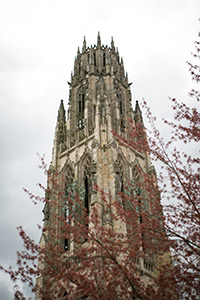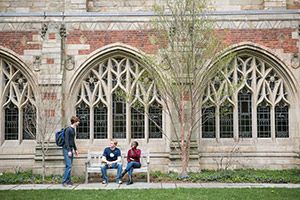Yale Paper Identifies Religious Trends
By Eileen Scott, Senior Writer A Yale Daily News survey of the class of 2019 revealed that, while a majority of students identify with some form of religious belief, a large portion of the incoming class has no spiritual moorings.
A Yale Daily News survey of the class of 2019 revealed that, while a majority of students identify with some form of religious belief, a large portion of the incoming class has no spiritual moorings. According to the Yale Daily News, more than half of the respondents self-described as religious, with the remainder identifying as atheist, agnostic, or non-religious. However, there is a notable difference between students who are considered religious and those who are Protestant.
The Yale Daily News reported that only 32 percent of "religious" freshmen plan to join a faith community on campus, while 68 percent of Protestant students intend to participate in a campus ministry.
Sang Yun, ministry director with Yale Students for Christ, agrees with those numbers, noting that "over the past 15 years or so, there has been a fairly consistent number of incoming freshmen who sign up at the activities fairs, etc."
The desire to engage in a faith community seems to be the tipping point among students when it comes to living out their faith. For example, 43 percent of students interested in joining a campus ministry did not anticipate having sex at all in college, according to an article written by Stephanie Addenbrooke and Emma Platoff for the Yale Daily News. However, a majority of the total respondents did anticipate having intercourse during the next four years.
 The article also points out that "religious students were more likely to say they felt anxious about their social experiences at Yale, with many identifying the party scene as a point of concern..." That concern rises from the belief that faith and the campus hookup culture of sex, drugs, and alcohol are incompatible.
The article also points out that "religious students were more likely to say they felt anxious about their social experiences at Yale, with many identifying the party scene as a point of concern..." That concern rises from the belief that faith and the campus hookup culture of sex, drugs, and alcohol are incompatible.While statistics often paint a dark picture when looked at in a snapshot, campus ministry leaders can remain hopeful that God's grace will be present among the darkness and university mission fields may be whiter unto harvest than they appear.
For example, a recent article in The Daily Beast noted that half of the young people raised in an atheist home become believers. The article cited Margaret Fox, Yale '05, a former atheist who now serves as a hospital chaplain and is working toward ordination in the Presbyterian Church.
Fox admits she had a sense of embarrassment when she first began questioning the validity of God at a top-tier school.
"There is a sort of ethos of independence in our culture, that you can get places on your own," Fox explained in the article. "And to need God felt sort of out of sync with the Ivy League achievement environment."
While attending Yale Law School, Fox sensed a longing for God.
"My contracts professor tried to convince us to study hard. He told us to think of ourselves as Captain Ahab, and the law as our whale," Fox recalls. "But I didn't feel like Ahab. I felt like Jonah, that there was something else I was supposed to be doing and I felt stuck inside."
Fox ultimately attended services at a Presbyterian church and was baptized. She also changed her post-graduate track and completed dual Law and Yale Divinity School degrees in 2015. Fox earned a Master of Theological Studies degree at Harvard Divinity School in 2008.
The Daily Beast article also referred to a 2013 Christianity Today essay penned by Harvard alumnus Jordan Monge '12, who chronicled her journey from atheism to Christianity at Harvard.
Monge recalled how conversations and encouragement from Christian friends played a big part in her conversion. As friends challenged her inconsistency as an atheist and shared life-changing books and resources, Monge's positions seemed defenseless and her image of love was transformed.
"The Cross no longer seemed a grotesque symbol of divine sadism, but a remarkable act of love. And Christianity began to look less strangely mythical and more cosmically beautiful," she wrote.
Despite the cloudy forecast that polls and statistics often present, testimonies from students like Fox and Monge can inspire campus ministers and student leaders to continue to put their hope and trust in a God who can do "immeasurably more than they can ask or imagine" (Eph. 3:20) as another academic year begins.





